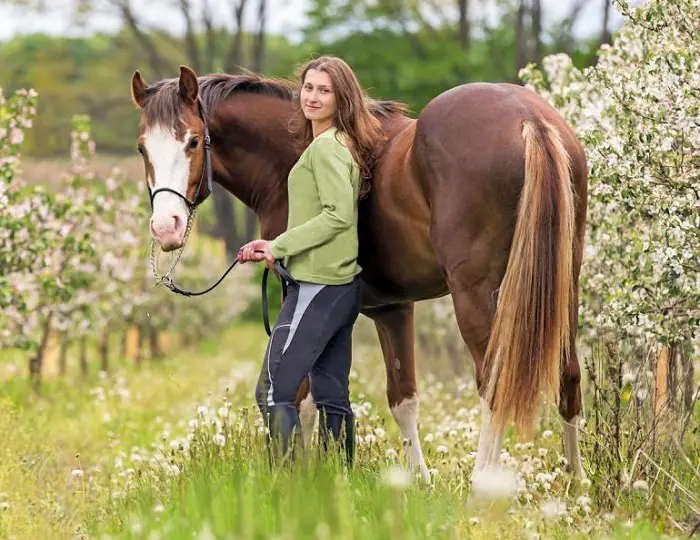Horses are fascinating animals with many characteristics that have evolved over millennia of domestication and selective breeding. Horses are highly social animals that form strong relationships with other horses and, in some cases, with humans. Horse ownership gives you comfort, pleasure, responsibility, and passion. They have a complex social structure within herds, with individuals establishing hierarchies through interactions such as grooming, play, and communication.
Purpose of Horse Rearing
The purpose of horse rearing, also known as horse breeding, varies depending on the goals of the breeder and the specific characteristics of the horses involved. Understanding horse behavior is crucial for successful breeding. Here are some everyday purposes of horse rearing:
- Improvement of Breeds: Breeders may rear horses to improve certain traits or characteristics within a specific breed. This could include enhancing attributes such as conformation, temperament, athleticism, or performance in a particular discipline.
- Production of Working Horses: Historically, horses were bred for specific purposes such as agriculture, transportation, or military use. While these roles have diminished in modern times, there is still demand for horses bred for work, such as ranch work, police work, or carriage driving.
- Sport and Competition: Many horses are bred specifically for participation in various equestrian sports and competitions. Breeding programs may focus on producing horses with the physical attributes, temperament, and athleticism needed for disciplines such as dressage, show jumping, eventing, rodeo, or racing.
- Recreation and Leisure: Some horses are bred for recreational riding and leisure activities. Breeders may prioritize producing horses well-suited for trail riding, pleasure riding, or casual equestrian pursuits.
- Therapeutic Riding Programs: Horses bred for therapeutic riding programs are selected for their calm temperament, gentle nature, and suitability for working with individuals with physical, emotional, or cognitive challenges. These horses play a crucial role in providing therapeutic benefits to riders.
- Preservation of Rare Breeds: Breeders may rear horses to preserve rare or endangered breeds. By maintaining genetic diversity and promoting responsible breeding practices, they help ensure the continued existence of these unique equine populations.
- Sale and Investment: Some breeders rear horses intending to sell them for profit or as investments. They may focus on producing horses in high demand or have the potential to excel in their chosen discipline, thereby maximizing their market value.
- Personal Enjoyment and Hobby: For many horse breeders, the primary purpose of rearing horses is simply the enjoyment and fulfillment they derive from working with these magnificent animals. Breeding and raising horses can be a gratifying hobby and lifestyle choice.
Regardless of the specific purpose, responsible horse breeding involves:
- Careful selection of breeding stock.
- Consideration of genetic traits and health factors.
- Proper management of pregnancies and foaling.
- Dedication to the welfare of both the parent horses and their offspring.
Duties of Responsible Horse Owner
Becoming a responsible horse owner involves several key steps and ongoing commitments. Here’s a guide to help you:
- Education and Research: Before getting a horse, educate yourself about their care, needs, and behaviors. Attend horsemanship classes, workshops, or clinics. Read books and online resources about horse care, training, and handling.
- Financial Preparation: Owning a horse can be expensive. Prepare a budget that includes expenses such as feed, bedding, veterinary care, farrier services, tack, and equipment. Ensure you have the financial resources to provide proper care for your horse.
- Facilities and Environment: Ensure appropriate facilities for keeping a horse, including a safe and spacious pasture or stable with access to clean water and shelter. Ensure your property is securely fenced to prevent escapes and keep predators out.
- Healthcare: Schedule regular veterinary check-ups, vaccinations, dental care, and farrier visits. Please learn how to identify the signs of illness or injury in your horse and take prompt action when necessary.
- Nutrition: Provide a balanced ration appropriate for your horse’s age, breed, workload, and health condition. Consult an equine nutritionist to create a feeding plan tailored to your horse’s needs.
- Exercise and Training: Develop a consistent exercise and training routine to stimulate your horse physically and mentally—bond with your horse through groundwork, riding, or other activities.
- Grooming and Maintenance: Regular grooming helps maintain your horse’s health and appearance. Brushing, bathing, and picking hooves should be part of your routine. During grooming horses, check for any signs of injury or skin problems.
- Socialization: Horses are social animals and thrive on interaction with other horses. Provide companionship for your horse by partnering with other compatible horses or spending time with them yourself.
- Respect and Patience: Treat your horse with kindness and patience. Build a trusting relationship through positive reinforcement and clear communication. Understand that each horse is an individual with its own personality and needs.
Continued learning is not just a suggestion, it’s a key to becoming a better horse owner. Stay updated on the latest equine care and training developments. Attend workshops and seminars or join online forums and communities to connect with other horse owners and share knowledge and experiences. This ongoing education will benefit your horse and enhance your enjoyment and understanding of horse ownership. Remember, owning a horse is a long-term commitment that requires dedication, time, and resources. Being responsible and attentive to your horse’s needs ensures a fulfilling and rewarding relationship for you and your equine companion.
Final Talk on Horse Ownership
Owning a horse is a significant responsibility that brings both rewards and challenges. It’s a commitment that requires careful consideration, preparation, and ongoing dedication. Horse ownership is a journey of learning, growth, and shared experiences. By being responsible, committed, and compassionate, you can provide your horse with the care and companionship they deserve while enjoying the many rewards of being a horse owner.
